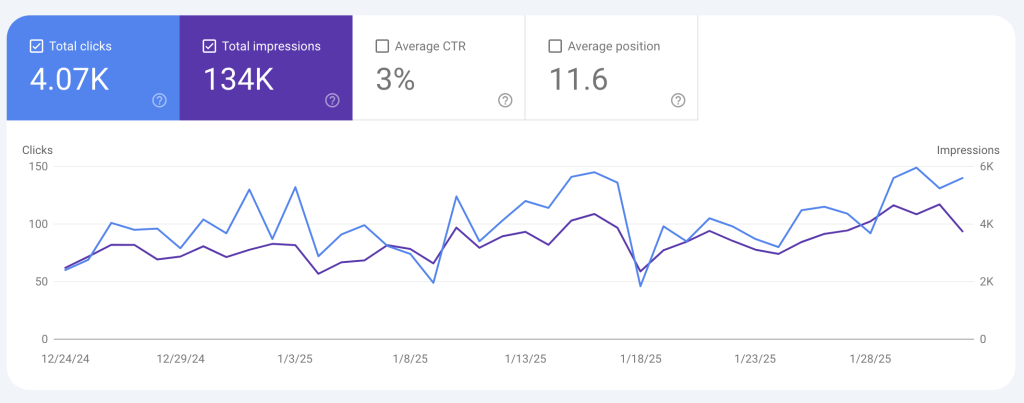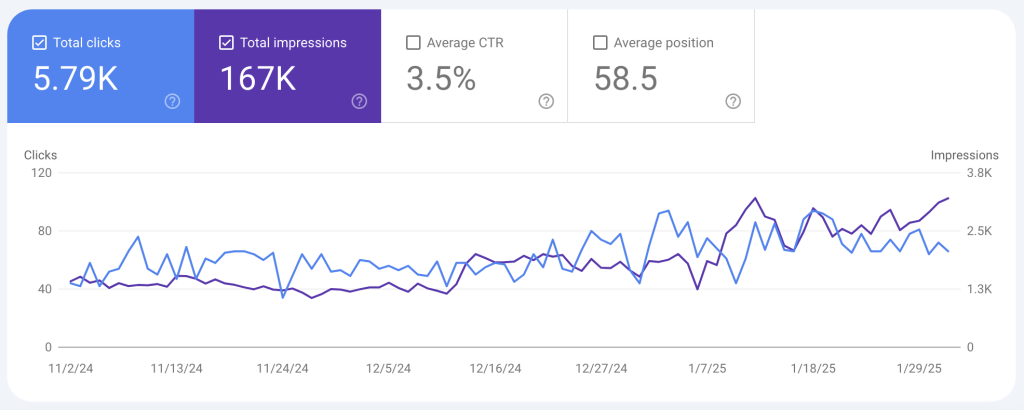SEO best practices often recommend keeping title tags under 60 characters to avoid truncation in search results. But new research by Joy Hawkins of Sterling Sky Inc. and Joel Headley, a former Google employee, challenges this notion, showing that longer title tags—sometimes exceeding 200 characters—can improve rankings on Google.
What the Case Study Found
Hawkins’ team tested longer title tags on multiple pages and saw a noticeable ranking boost for key search queries. Instead of sticking to a rigid character limit, they found that adding more relevant keywords and descriptive phrases helped Google better understand page content, leading to improved visibility in search results.
Below is a screenshot she shared for a page her team optimized. The title tag is 229 characters.

Another example she mentioned was a personal injury lawyer. For this one, they updated the title tag to include an additional target keyword. The updated title tag was 232 characters long, and the result was a move from position 6 to position 4 for the targeted keyword.
I’ve been doing this for several months now and have plenty of examples of my own. Here is one where we doubled the title tag length on December 24th.

And here is another one where on December 9th we increased the title tag from 57 characters to 197.

Why This Matters for SEO
- More Keywords, More Relevance – A longer title tag allows for additional keyword variations, increasing the chances of ranking for different search intents.
- Better Context for Google – Google often rewrites title tags, so giving it more context may help influence what appears in search results.
- Google is going to rewrite the title tag anyhow – You might as well optimize it for SEO and sacrifice any perceived CTR gains you think you might have from a shorter title tag.
How to Use Longer Title Tags Effectively
- Prioritize Important Keywords First – Google still truncates longer titles in search results, so put the most important words up front.
- Avoid Keyword Stuffing – More characters don’t mean better rankings if the title reads unnaturally. Instead add additional closely related queries, action items, etc.
- Test and Monitor – Not all industries may see the same benefits, so test extended title tags and track their impact on rankings and traffic.
Some examples of what I mean
Example 1: Say you have a page for a free SKU generator.
Instead of just using a title like:
Free SKU Generator – ACME Corp.
Use:
SKU Generator – Create SKUs On Demand For Free – Effortlessly Build SKUs For Your Entire Inventory – ACME Corp
Example 2: You have a page about how to build AI agents
Instead of:
How To Build AI Agents – ACME Corp.
Use:
Learn How To Build AI Agents – Free Guide For Building AI Agents From Beginning To Implementation – Avoid These 5 Mistakes In Building Your AI Agent – ACME Corp
Example 3: You have a page about setting up a server to host the game Minecraft.
Instead of:
Setting Up A Minecraft Server – ACME Corp.
Use:
Setting Up A Minecraft Server For Beginners and Experts – Simple Guide To Hosting Your Own Minecraft Server – Optimizing Your Self-Hosted Minecraft Game – ACME Corp.
Final Thoughts
Longer title tags can help with rankings when used strategically. Instead of blindly following the old “keep it short” rule, consider testing longer, keyword-rich titles to see if they improve performance for your site.
For a deep dive into the study, check out Joy Hawkins’ full analysis at Sterling Sky Inc.
🔗 Read the full case study

